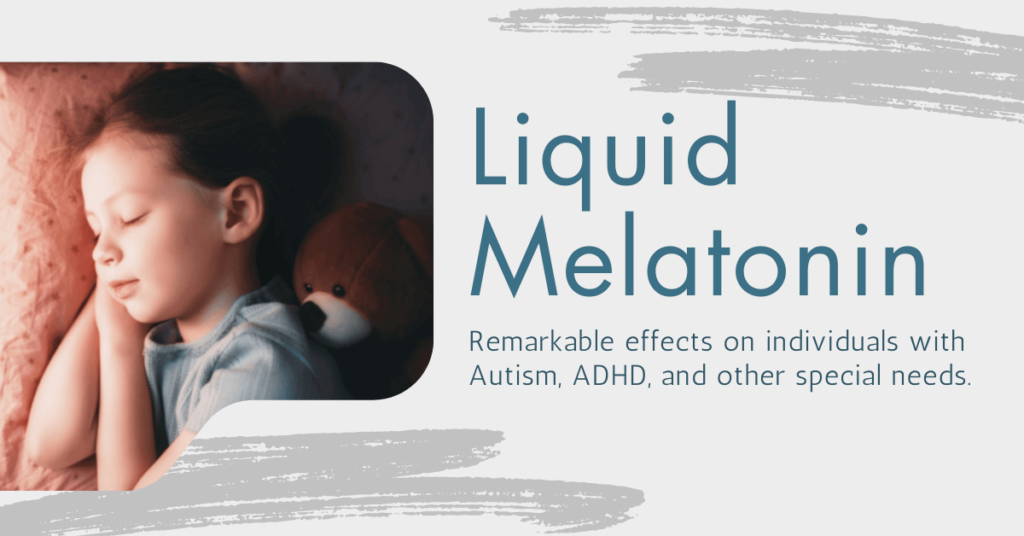Disclosure: This post may contain affiliate links. As an Amazon Associate, I earn from qualifying purchases. This means that if you click on a link and make a purchase, we may earn a commission at no additional cost to you. We only promote products we truly believe in, and your support helps us continue providing valuable content to our readers.
- I. Introduction
- II. The Role of Melatonin
- III. Benefits of Liquid Melatonin for Individuals with Special Needs
- IV. Advantages of Liquid Melatonin for Special Needs Individuals
- V. Advantages Over Other Sleeping Aids
- VI. Melatonin’s Multi-faceted Impact on Health and Wellness
- VII. Tips for Choosing and Using Liquid Melatonin for Special Needs Individuals
- VIII. Dosage and Administration
- IX. Considerations for Special Needs Individuals
- X. Conclusion: Unleashing the Power of Liquid Melatonin for Special Needs Sleep
- XI. Frequently Asked Questions
I. Introduction
Achieving a good night’s sleep can be very challenging for some people. This is especially true for individuals with Autism, ADHD, and other special needs. Sleep disturbances are common among these individuals. It can lead to behavioral challenges during the day, affecting their well-being and the quality of life for their families.
One potential solution that has gained attention in recent years is liquid melatonin. A natural sleep aid that has shown promise in promoting restful slumber. Especially for individuals with neurodevelopmental conditions. This article aims to provide a comprehensive guide to understanding liquid melatonin. And learn of its potential benefits for individuals with special needs.
II. The Role of Melatonin
What is Melatonin?
Melatonin is a hormone produced naturally by the pineal gland in the brain. It plays a crucial role in regulating the sleep-wake cycle, also known as the circadian rhythm. The amount of light exposure influences melatonin production, with levels typically rising in the evening to promote sleepiness.
How Does Melatonin Work?
Melatonin works by interacting with melatonin receptors in the brain. It helps to signal the body that it’s time to sleep. Disruptions in melatonin production and impairment of melatonin receptors can contribute to sleep difficulties.
For special needs individuals, melatonin imbalances may contribute to sleep disturbances. In individuals with autism, it has been observed that melatonin levels may fluctuate. It leads to challenges in falling asleep and staying asleep. Same for individuals with ADHD. They often face difficulty winding down due to disrupted melatonin production. It makes it challenging to transition to a restful state.
III. Benefits of Liquid Melatonin for Individuals with Special Needs
1. Improves Sleep Onset Time
Liquid Melatonin has effectively reduced the time it takes to fall asleep. Sleep difficulties are common among those with autism and other special needs. This benefit can significantly improve their sleep routines.
Falling asleep faster can lead to less frustration and anxiety associated with bedtime. This results in a more positive sleep experience.
2. Increases Total Sleep Duration
Research indicates that Liquid Melatonin can extend the total duration of sleep. It is precious as many individuals with autism struggle with nighttime awakenings. Individuals with autism and special needs also often suffer from fragmented sleep patterns.
Longer sleep duration supports better physical and mental well-being. It allows for more restorative rest.
3. Enhances Overall Sleep Quality
Liquid Melatonin has been associated with improvements in the overall quality of sleep. It includes achieving more profound, more restful sleep. Individuals wake up feeling refreshed and better equipped to face the day.
4. Improved Focus and Daytime Functioning
Better sleep quality can translate into improved focus and attention.
It can result in increased alertness and improved mood. It helps reduce daytime fatigue. It contributes to better daytime functioning.
IV. Advantages of Liquid Melatonin for Special Needs Individuals
1. A Gentle and Natural Alternative.
Liquid Melatonin emerges as a gentle and natural alternative among sleep aids, especially for individuals with Autism, ADHD, and special needs.
Unlike other sleep aids, Liquid Melatonin’s natural properties make it a safer—and potentially more practical option for this population.
Its gentle nature can be particularly beneficial for individuals with sensory sensitivities as it minimizes the risk of adverse reactions.
It is excellent for individuals who struggle with swallowing pills. The liquid formulation offers a more accessible and more comfortable method of administration. It can be mixed with liquids or taken directly.
2. Quicker Effects with Liquid Formulation.
The liquid formulation of melatonin offers better absorption rates. It might lead to quicker effects.
Liquid melatonin bypasses the digestive process compared to traditional tablet or capsule forms. It allows for faster uptake into the bloodstream.
This rapid absorption can be beneficial for individuals with special needs. They may experience a faster onset of sleep-promoting effects.
3. Flexibility in Dosage Adjustments.
Liquid Melatonin allows for flexible dosage adjustments. They are making it easier to tailor supplementation to each individual’s unique needs.
Sleep difficulties can vary widely among individuals with Autism, ADHD, and special needs. So, personalized dosages are crucial.
Starting with the lowest effective dose and gradually adjusting as needed. It ensures that each person receives an appropriate amount of melatonin.
4. Promoting Smoother Sleep Transitions.
Incorporate Liquid Melatonin into the sleep routines of individuals with special needs. It can lead to a smoother transition into restful slumber.
Take Liquid Melatonin approximately 30 minutes to an hour before bedtime. The supplement can synchronize their internal body clock. It promotes a more structured sleep routine.
Consistency in timing and administration helps establish a sleep-inducing routine. It encourages better sleep quality and overall well-being.
V. Advantages Over Other Sleeping Aids
Liquid melatonin offers distinct advantages when compared to other sleeping aids. These alternatives include prescription medications or herbal supplements.
1. Accessibility
Melatonin is available over the counter in most places. It does not require a prescription. It makes it more accessible for families and caregivers.
2. Short Half-Life
Liquid melatonin has a short half-life, meaning it is metabolized relatively quickly. Ideal for those who need help to fall asleep but dislike lingering effects in the morning.
3. Known Mechanisms
Melatonin is a well-studied hormone with a clear understanding of its mechanisms. It can provide caregivers with a more reliable option. Unlike herbal supplements, which may have variable quality and effects.
4. Safer
Liquid Melatonin is less likely to cause adverse side effects. And unlikely to result in dependency.
5. Gentle Formulation
It can be well suited for individuals with sensory sensitivities. It is ideal for individuals with an aversion to certain textures.
VI. Melatonin’s Multi-faceted Impact on Health and Wellness
Melatonin’s influence extends beyond sleep regulation, encompassing critical aspects of overall health.
1. Potent Antioxidant Properties
Melatonin serves as a powerful antioxidant in the body. Antioxidants play a crucial role in neutralizing harmful free radicals. Free radicals are unstable molecules that can damage cells and DNA. By acting as an antioxidant, melatonin helps protect cellular health. They reduce the risk of oxidative stress-related diseases.
Oxidative stress has been linked to various health issues. It includes cancer, cardiovascular diseases, and neurodegenerative conditions. Melatonin’s ability to combat free radicals is a crucial factor. It positions it as a valuable ally in maintaining overall well-being.
2. Supporting the Immune System
Scientific research suggests that melatonin plays a role in enhancing the immune system. This hormone may bolster immune responses. It makes the body more effective at defending against infections and illnesses.
Melatonin contributes to optimizing immune function. It, in turn, leads to a stronger and more robust defense mechanism. It potentially reduces the susceptibility to various pathogens and diseases.
3. Mental Health and Emotional Well-being
The relationship between melatonin and mental health is a subject of growing interest. As a vital regulator of sleep, melatonin contributes significantly to emotional well-being.
Disruptions in sleep patterns can be attributed to melatonin imbalances. These imbalances have been associated with mood disorders such as depression and anxiety. Ensuring a balanced melatonin production can aid in maintaining stable sleep patterns. It potentially alleviates mood-related issues.
Furthermore, melatonin plays a role in improving sleep quality. It can indirectly impact mental health by reducing stress and promoting relaxation. Better sleep fosters emotional stability and resilience against daily stressors.
VII. Tips for Choosing and Using Liquid Melatonin for Special Needs Individuals
Selecting the right Liquid Melatonin product is crucial for optimizing its benefits. Look for reputable brands that undergo third-party testing. It is to ensure purity and accurate dosages. For individuals with sensory sensitivities, consider flavors and textures that are well-tolerated.
Establish a consistent bedtime routine and create a calming sleep environment. These can complement the effects of Liquid Melatonin. Limit screen time before bed and incorporate relaxing activities. Using sensory aids, such as weighted blankets, may enhance the quality of sleep.
1. Choosing the Right Liquid Melatonin Product
Achieve optimal benefits by choosing a high-quality Liquid Melatonin product. Prioritize reputable brands that ensure product purity and accuracy of dosages.
Go for brands that have undergone third-party testing, as they are more reliable. These tests independently verify product quality and contents. It provides an added layer of assurance.
For individuals with sensory sensitivities, consider the taste and texture of the product. Certain flavors or textures may be more acceptable and tolerable than others. Seek out brands that offer various options to cater to individual preferences.
2. Establishing a Consistent Bedtime Routine
A consistent bedtime routine can enhance the effects of Liquid Melatonin. It can help facilitate better sleep. Try to administer the supplement at the same time each night. It is to help the individual’s body clock adjust and predict sleep timings.
Limiting screen time before bed is beneficial. The blue light emitted from screens can interfere with the body’s natural melatonin production. Reducing this exposure can help to promote restful sleep.
3. Creating a Calming Sleep Environment
The sleep environment plays a significant role in promoting good sleep. Aim to make the sleep environment as calming and comfortable as possible. Minimize noise and light, and maintain a comfortable temperature.
Incorporate relaxing activities before bed. It could include reading, calming music, or gentle stretching exercises. It can help signal the body that it’s time to sleep.
4. Utilizing Sensory Aids
Sensory aids such as weighted blankets may further enhance the quality of sleep. These aids provide deep pressure stimulation. It can promote feelings of calm and security, aiding in sleep induction.
Experiment with different sensory aids. Find what best suits the individual’s needs and preferences. Always prioritize comfort and safety when using these tools.
5. Other Supporting Factors
Diet and Nutrition. A balanced diet can impact sleep quality. Avoid heavy meals close to bedtime and limit caffeine intake. These can contribute to improved sleep.
Physical Activity. Regular physical activity can promote better sleep for individuals with special needs. Engage in age-appropriate activities during the day. It can help expend energy and contribute to more restful nights.
Behavioral Interventions. Incorporate behavioral strategies such as relaxation techniques, visual schedules, and sensory-friendly activities. These can complement the use of liquid melatonin and promote better sleep.
The journey to improved sleep can be more manageable and effective. Always remember that each person is unique. And finding the right approach requires patience and individualization.
VIII. Dosage and Administration
Establishing the correct dosage and timing is essential. It is to optimize the effects of Liquid Melatonin.
It’s important to note that the U.S. Food and Drug Administration (FDA) does not regulate melatonin as it is available as a dietary supplement.
Dosage recommendations can vary widely. It is advised to start with the lowest effective dose and adjust as needed. Administer the supplement approximately 30 minutes to an hour before their desired bedtime. It can help synchronize their internal body clock with the external environment. It promotes a more structured sleep routine.
IX. Considerations for Special Needs Individuals
1. Consultation with Healthcare Professionals
Consultation with a healthcare professional is essential.
It should be done before incorporating liquid melatonin into the individual’s routine. This is especially true for individuals with special needs.
A qualified medical practitioner can offer personalized recommendations. They can assess the individual’s medical history and current medications. They can evaluate the specific sleep challenges and determine the appropriate dosage. They can help monitor its effects to ensure safe and effective use.
2. Monitoring and Adjusting Dosage
Regular monitoring of the individual’s response to liquid melatonin is crucial. Adjustments to the dosage might be necessary based on the individual’s sleep patterns. Dosage is also adjusted based on observed improvements or side effects.
3. Potential Side Effects
Melatonin is generally considered safe for short-term use. Possible side effects may include daytime drowsiness, changes in mood, or stomach discomfort. Monitoring for these effects is essential, especially for individuals with communication challenges.
X. Conclusion: Unleashing the Power of Liquid Melatonin for Special Needs Sleep
The journey toward improving sleep for special needs individuals requires a multi-faceted approach. When used under professional guidance, liquid melatonin can be a valuable tool. It can help address sleep challenges.
It’s important to remember that sleep improvement encompasses various factors. It includes lifestyle adjustments, supportive strategies, and personalized medical advice. Combining these elements can help provide individuals with the best possible sleep environment.
XI. Frequently Asked Questions
Is liquid melatonin safe for long-term use?
A: The long-term safety of melatonin supplements is still being studied. It’s generally recommended to use melatonin for short periods. And under the guidance of a healthcare professional.
Can I adjust the dosage of liquid melatonin on my own?
A: Seeking guidance from a healthcare professional is highly recommended. It is imperative before making any adjustments to the dosage. Individual needs vary, and an expert can provide tailored recommendations.
Are there any interactions between melatonin and medications?
A: Melatonin can interact with certain medications. Sharing valuable information with your healthcare provider is essential. It includes any medications the individual is taking.
Can lifestyle changes alone improve sleep for special needs individuals?
A: Lifestyle changes can undoubtedly have a positive impact on sleep quality. It includes sleep hygiene practices and more. However, for some individuals, melatonin supplementation may be a helpful addition.
How can I create a sensory-friendly sleep environment?
A: A sensory-friendly sleep environment can be achieved by using soft lighting. Use comfortable bedding and minimize sensory triggers that might disrupt sleep.
Is Liquid Melatonin Safe for Daily Use in Special Needs Individuals?
A: Liquid Melatonin can be safe for short-term use. It is when administered at appropriate dosages. For daily use, it’s best to consult with a healthcare professional. It determines the most suitable approach for each individual’s needs.
Can Liquid Melatonin Be Taken Along with Other Medications?
A: Consult a healthcare provider before combining Liquid Melatonin with other medications. It is essential to avoid potential interactions and ensure safety and efficacy.
Can Liquid Melatonin Help Special Needs Individuals with Anxiety or Sensory Sensitivities?
A: Liquid Melatonin may not directly address anxiety or sensory sensitivities. Improved sleep quality may contribute to reduced anxiety. And increased tolerance to sensory stimuli.
What Is the Recommended Liquid Melatonin Dosage for Special Needs Individuals?
A. The recommended dosage may vary depending on age and weight. It may also depend on the specific sleep difficulties. It is crucial to consult with a healthcare professional. It is to determine the appropriate dosage for each individual.
How Long Should Liquid Melatonin be Used for Special Needs Individuals?
A: The duration of use should be discussed with a healthcare professional. It will depend on the individual’s sleep needs and response to supplementation. Regular follow-ups and adjustments may be necessary.



